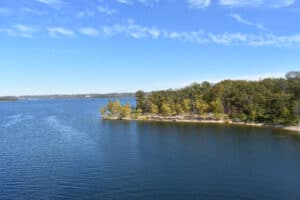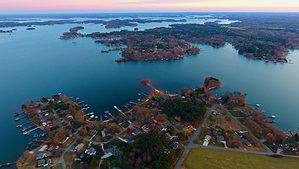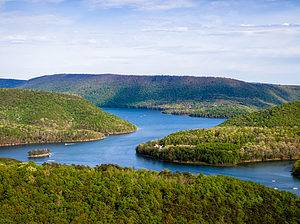Loon Lake in Washington is a hidden gem that promises unforgettable experiences and a tranquil getaway surrounded by nature. In this article, we delve into the key aspects of Loon Lake, including fishing, size, depth, and other essential information that will help you plan your next adventure.
We’ll provide you with valuable insights into the lake’s topography and the species of fish you can expect to encounter. Additionally, we will touch upon tips and techniques to enhance your fishing success and ensure an enjoyable experience.
Loon Lake in Washington is not to be confused with the three other Loon Lakes in California, Oregon, and New York. With that clarified, let’s dive into the depths of Washington’s Loon Lake to discover a world brimming with fun opportunities for the entire family!
Loon Lake: Size And Depth
Loon Lake, nestled in the picturesque landscapes of Washington State, offers anglers and nature enthusiasts a serene fishing and recreational experience. With a width of approximately two miles and a length of one mile, this medium-sized lake boasts a maximum depth of 100 feet (30 meters). Its tranquil waters provide a perfect habitat for a variety of fish species, making it a sought-after destination for fishing enthusiasts.
Whether you choose to fish from the shore, or a boat, or even try your hand at ice fishing during the winter months, Loon Lake provides ample opportunities to indulge in your favorite angling pursuits.
History And Purpose of Loon Lake
Loon Lake in Washington has a rich history and serves various purposes. The lake was established as a private park in 1889 by D.C. Corbin, a railroad builder and banker. It later became a public park when it was sold to Evan Morgan in 1897. Substantial white settlement in the Loon Lake area began in the 1870s, driven by mining, agriculture, logging, lumber milling, and ice industries.
The Loon Lake Historical Society, located in the old schoolhouse in Loon Lake, Washington, is dedicated to preserving and sharing the area’s history. The society provides insights into the local history, including the early settlers, the development of the community, and the changes that have taken place over the years.
Today, Loon Lake continues to be a popular destination for residents and visitors alike, offering opportunities for recreation, relaxation, and a chance to explore the region’s rich history.
Recreational Activities at Loon Lake
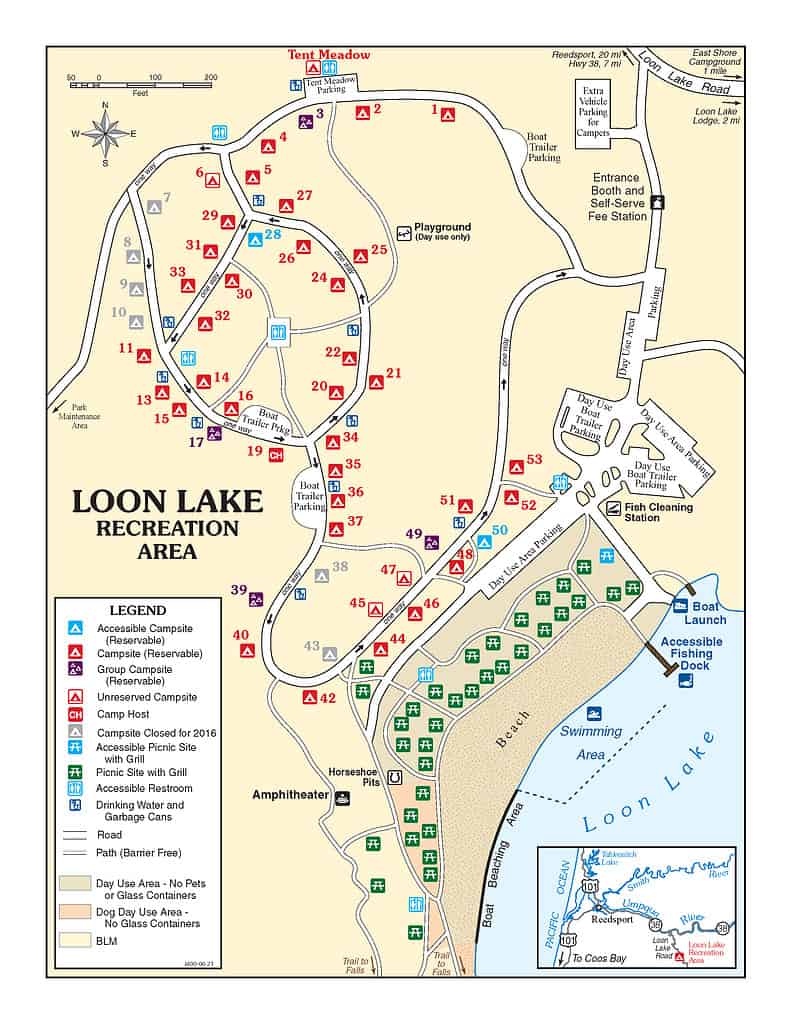
Recreational opportunities abound at Loon Lake.
©”Loon Lake Recreation Area” by BLM Oregon & Washington is licensed under CC BY 2.0. – License
Loon Lake, located on the Oregon Coast, offers a wide range of recreational activities for visitors to enjoy. Here are some of the activities you can engage in at Loon Lake:
Boating: Loon Lake provides excellent opportunities for boating and water activities. Visitors can enjoy waterskiing, canoeing, kayaking, and even motorized boating on the lake.
Fishing: Loon Lake is a popular spot for fishing enthusiasts. The lake is home to various fish species, including bass, perch, and more. Anglers can try their luck and enjoy a day of fishing on the lake.
Swimming: The lake features sandy beaches where visitors can relax and swim in the clear waters of Loon Lake. It’s a great way to cool off and enjoy the natural beauty of the area.
Camping: There are campsites available at Loon Lake, allowing visitors to immerse themselves in nature and enjoy a camping experience. Some campsites are ADA-accessible, catering to different needs.
Hiking: The surrounding area offers hiking opportunities for those looking to explore the natural beauty of Loon Lake. Trails can lead you through scenic landscapes and provide opportunities for wildlife spotting.
Nature-Based Activities: Loon Lake Lodge & Retreat Centre offers a variety of nature-based activities for groups. These activities may include interpretive trails, swimming, canoeing, and other outdoor adventures.
Fishing At Loon Lake
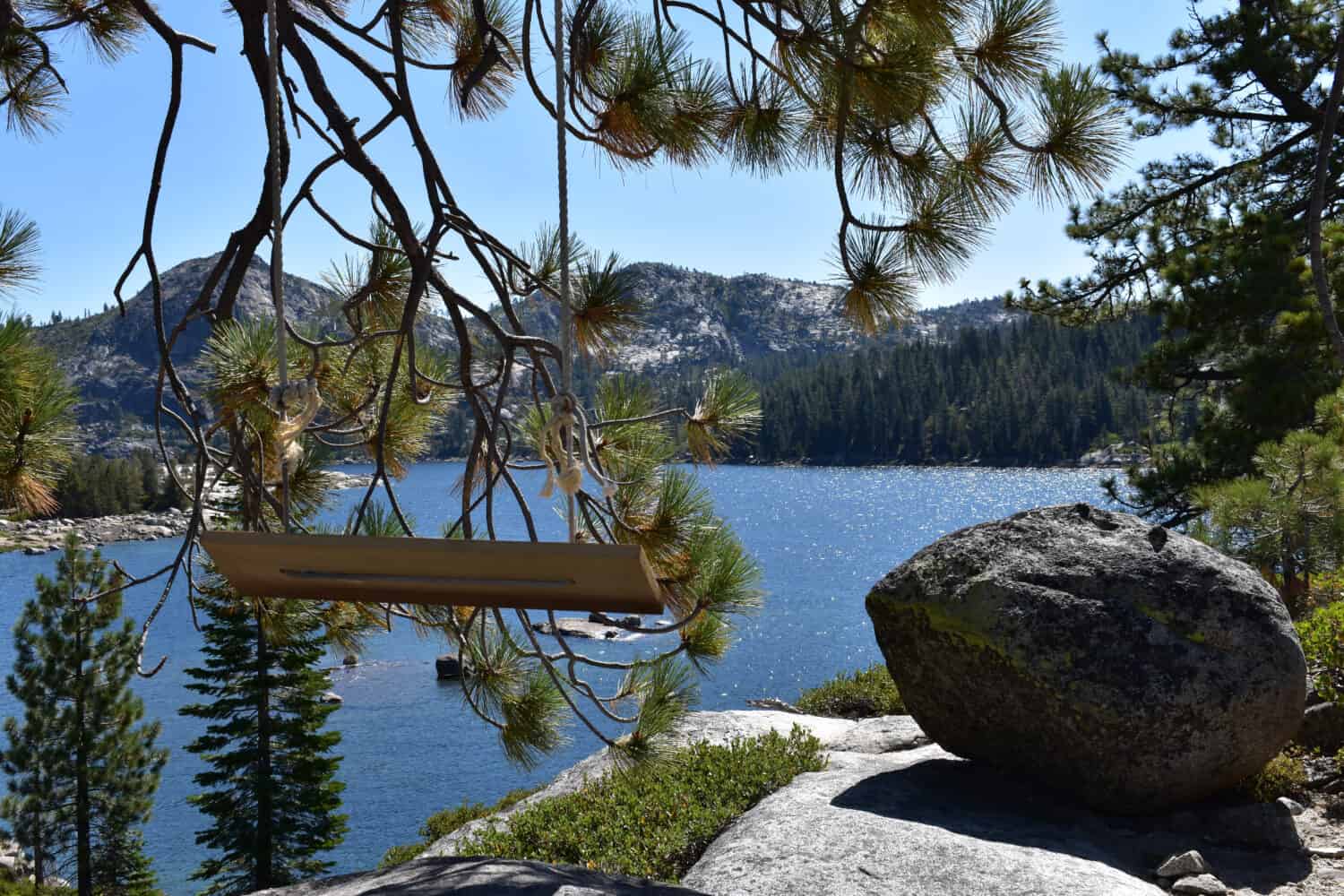
Loon Lake offers a wide array of fishing opportunities for anglers of all skill levels.
©Mekong Photography/Shutterstock.com
As you explore the depths of Loon Lake, you’ll find that its stratified nature adds an intriguing dimension to your fishing experience. Understanding the lake’s thermocline and seasonal variations can greatly enhance your chances of success. By adapting your fishing techniques and targeting the appropriate depth, you can increase your chances of landing that prized catch.
Loon Lake offers a wide array of fishing opportunities for anglers of all skill levels. The lake’s depth and topography contribute to its thriving ecosystem, supporting a diverse range of aquatic life.
Types of Fish in Loon Lake, Washington
The types of fish found in Loon Lake, Washington, include:
- Large and Smallmouth Bass
- Rainbow Trout
- Brown Bullhead
- Yellow Perch
- Bluegill
- Green Sunfish
- Kokanee
- Lake Trout
- Pumpkinseed Sunfish
- Tiger Trout
Tips for Successful Fishing at Loon Lake
Here are some tips for successful fishing at Loon Lake, taking into account its thermocline, seasonal variations, and targeting the appropriate depth:
Understand the Thermocline: The thermocline is the layer of water in the lake where there is a rapid change in temperature. In summer, it is usually found at a depth of around 20-30 feet. Fish tend to congregate above or below the thermocline, depending on the temperature they prefer.
Adjust Your Techniques: Different fish species have different preferences when it comes to temperature and depth. Research the specific fish species you are targeting and adapt your fishing techniques accordingly.
Consider Seasonal Variations: Pay attention to the seasonal variations in fish behavior. In spring, fish may move to shallower areas to spawn, so focus your efforts near the shoreline or submerged structures like fallen trees or weed beds. In summer, fish may seek deeper, cooler water, so consider targeting deeper areas.
Experiment with Depth: Use a fishfinder or depth sounder to locate the thermocline and determine the depth at which fish are actively feeding. Adjust your bait or lure presentation to the appropriate depth.
Time Your Fishing Trips: Fish are often more active during certain times of the day. Early morning and late afternoon tend to be prime feeding times, as fish are more active in low-light conditions. However, this can vary depending on the fish species and the time of year.
Fishing can also be influenced by other factors such as weather conditions and water clarity. Gather local knowledge and consult with experienced anglers or local fishing guides for the most up-to-date information and tips specific to Loon Lake.
The Best Launch Spots and Marinas
Below are just a couple of options available for boat launching and marinas at Loon Lake. It’s always a good idea to check with local resources or consult the Loon Lake Chamber of Commerce or visitor information centers for the most up-to-date and comprehensive information on launch spots and marinas in the area.
Launch Spot
Granite Point Resort: Granite Point Resort is a private resort that offers convenient boat launching on Loon Lake. It is known for providing excellent facilities and services for boaters and resort guests.
Marina
Loon Lake Marina: Loon Lake Marina is another popular spot for boat launching and marina services. It offers boat rentals, moorage, and other amenities for visitors.
Camping Near Loon Lake in Washington
There are several camping options near Loon Lake in Washington. Here are some popular choices:
Deer Lake Resort: Deer Lake Resort offers camping, RV park, and cabin rentals. It is located near Loon Lake and provides a convenient option for camping enthusiasts.
Granite Point: Granite Point Park is a historic resort on the southeastern shore of Loon Lake. It has been a popular camping destination for over 100 years and offers a range of facilities and amenities.
Loon Lake Campgrounds: There are various campgrounds near Loon Lake, including those in state parks, national parks, and private farms/vineyards. Booking platforms like The Dyrt and Tripadvisor can provide more information and options for camping.
Loon Lake Recreation Site: Managed by the Bureau of Land Management, the Loon Lake Recreation Site offers campsites for tent and small trailer/RV camping. It is a scenic location for outdoor enthusiasts.
Free Camping Areas: There are also free camping areas available near Loon Lake. Websites like Free Campsites Near You provide maps, photos, and user reviews of these locations.
Plant And Animal Life Around Loon Lake
The plant and animal life around Loon Lake in Washington is diverse and rich in biodiversity. Below is some general information about the types of plants and animals you might find in this region:
Plant Life:
In and around Loon Lake, you can expect to find a variety of plant species, including:
Aquatic plants: These may include species such as water lilies, cattails, bulrushes, and various types of pondweed.
Riparian vegetation: Along the shorelines, you may find trees such as willows, alders, and cottonwoods, as well as shrubs like dogwood and elderberry.
Forest vegetation: The surrounding forests may consist of coniferous trees like Douglas fir, western red cedar, and pine, as well as deciduous trees like maple and oak.
Animal Life:
Loon Lake and its surrounding area provide habitat for a range of animal species. Some common examples include:
Fish: Loon Lake is known for its trout population, including tiger trout and rainbow trout, which are stocked by the Washington Department of Fish and Wildlife. Other fish species that may be present include bass, perch, and more.
Waterfowl: The lake and wetlands around Loon Lake attract various waterfowl species, including ducks, geese, and possibly swans.
mammals: The surrounding forests and meadows may be home to mammals such as deer, elk, squirrels, raccoons, and possibly bears.
birds: Loon Lake is likely to be visited by a variety of bird species, including songbirds, raptors, and possibly migratory species.
These are just a few examples, and the actual plant and animal species present at Loon Lake may vary. To get more detailed and accurate information, it is recommended to consult local resources such as the Washington Department of Fish and Wildlife or regional field guides specific to the area around Loon Lake.
Safety Tips While Enjoying Loon Lake:
When it comes to enjoying Loon Lake in Washington, it’s important to prioritize safety. Here are some general safety tips to keep in mind:
Water Safety:
If you plan on swimming, boating, or participating in water activities, follow these guidelines:
- Wear a properly fitted life jacket when boating or participating in water sports.
- Swim in designated areas and always supervise children in or near the water.
- Be aware of weather conditions and the lake’s currents.
- Avoid alcohol consumption while operating a boat or participating in water activities.
Sun Safety:
Protect yourself from the sun’s harmful rays:
- Apply sunscreen with a high SPF before heading out and reapply as needed.
- Wear protective clothing, hats, and sunglasses to minimize sun exposure.
- Seek shade during the hottest parts of the day.
Wildlife Safety:
Respect the wildlife and their habitats:
- Observe from a safe distance and do not feed or approach wild animals.
- Store food securely to prevent attracting wildlife to your campsite.
- Be aware of potential encounters with snakes, bears, or other wildlife. Learn about their behavior and what to do in case of an encounter.
Campfire Safety:
If you plan on having a campfire, follow these safety precautions:
- Check for fire restrictions or bans in the area before starting a campfire.
- Keep a bucket of water or a fire extinguisher nearby in case of emergencies.
- Never leave a campfire unattended and ensure it is completely extinguished before leaving.
General Safety:
Additional safety tips include:
- Let someone know your plans and expected return time if you’re going hiking or exploring.
- Be cautious of uneven terrain, slippery rocks, or other hazards in the area.
- Follow all posted rules and regulations at the lake and surrounding facilities.
- Remember, these are general safety tips, and it’s important to be aware of specific regulations and guidelines provided by local authorities and the Washington Department of Fish and Wildlife for Loon Lake.
How to Preserve Loon Lake’s Ecology When Visiting
Preserving the ecology of Loon Lake in Washington is crucial to maintain its natural beauty and protecting the plant and animal life that depend on it. Here are some tips on how to preserve Loon Lake’s ecology when visiting:
Respect Wildlife
Observe wildlife from a safe distance and avoid feeding or approaching them. Do not disturb nesting sites or habitats. Keep pets on a leash and under control to prevent them from disturbing wildlife.
Practice Leave No Trace
Follow the principles of Leave No Trace, which include packing out all trash, disposing of waste properly, and leaving natural and cultural resources undisturbed. Minimize your impact on the environment by staying on designated trails and campsites.
Use Eco-Friendly Products
When using personal care products, sunscreen, or insect repellent, choose eco-friendly options that are biodegradable and do not harm the lake or its inhabitants.
Be Mindful of Water Quality
Avoid introducing pollutants into the lake. Do not dispose of chemicals, soaps, or other substances directly into the water. Use designated restroom facilities and do not contaminate the lake or its shoreline.
Follow Fishing Regulations
If you plan to fish, familiarize yourself with the fishing regulations and obtain the necessary licenses. Practice catch-and-release whenever possible and handle fish with care to minimize harm.
Stay on Designated Paths
Stick to designated trails, paths, and camping areas to protect fragile vegetation and prevent erosion. Additionally, avoid trampling on sensitive plant life and stay away from protected areas.
Educate Yourself
Learn about the local ecosystem, including the plants and animals that call Loon Lake home. Respect and appreciate the natural environment by understanding its importance and unique characteristics.
Support Conservation Efforts
Consider supporting local conservation organizations or participating in volunteer programs that help preserve and protect Loon Lake’s ecology. For example, participate in cleanup events or donate to conservation initiatives.
By following these guidelines, you can help preserve Loon Lake’s ecology and ensure that future generations can enjoy its natural beauty and thriving ecosystem.
In Conclusion
Loon Lake in Washington offers a fantastic fishing experience amidst its scenic beauty. Due to its ample size and impressive depth, the lake provides a diverse range of fish species. Anglers enjoy catching trout and bass in this haven for fishing enthusiasts of all levels.
The lake’s serene ambiance and lush surroundings create a peaceful and enjoyable atmosphere for visitors to connect with nature. However, remember that responsible fishing practices and conservation efforts are vital to preserving the lake’s delicate ecosystem.
By adhering to fishing regulations, practicing catch-and-release, and respecting the environment, we can ensure that Loon Lake remains a thriving habitat for fish and a cherished destination for visitors.
The photo featured at the top of this post is © Alexander Lukatskiy/Shutterstock.com
Thank you for reading! Have some feedback for us? Contact the AZ Animals editorial team.



